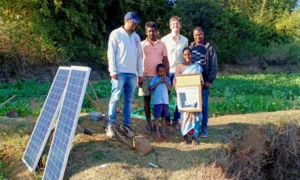Protests against bauxite mining in the forests of Koraput in Odisha are growing as the local tribal population is opposing mining operations in their Mali parbat (hill). Last week, on November 22, the Odisha State Pollution Control Board organised a public hearing on bauxite mining in Kankadaamba village, nearly 500 kilometres away from the state capital, Bhubaneswar, which was met with stiff resistance from the local Adivasis.
According to local inhabitants, the number of armed security forces and officials far outnumbered the local tribal people at the public hearing that took place. On the day of the hearing, members of the Mali Parbat Suraksha Samiti (Mali Hill Save Committee) staged a protest demanding that the officials cancel the mining project and protect the virgin hill and forest area.
“If the Odisha State Pollution Control Board gives a no objection certificate to the company [Hindalco Industries Limited], we will intensify our agitation,” Prafulla Samantra, the president of Lok Shakti Abhiyan, one of the protesting groups, told Gaon Connection. “Mining disturbs groundwater, air and soil in the area. We will not allow this to happen,” he added vehemently.
Two months ago, on September 22, the district administration had tried to hold a public hearing for the same project. However, no headway was made. The protestors had raised anti-government slogans. Between September 24 and 26, the police arrested 28 tribal leaders who are still in jail.
“The hearing process on September 22, could not be completed due to local resistance because of which we organised another public hearing on November 22,” Rajendra Majhi, additional district magistrate, Koraput, told Gaon Connection.
There were allegations by the local public that the venue was cordoned off and only those people who supported the project were allowed in after being duly screened by the police, government officials and the employees of Hindalco. The hearing was also hurriedly concluded in an hour without providing people opposed to the project an opportunity to voice their objections, villagers complain.
Bauxite mining in Koraput
The agitators protested against mining in and around the Mali hillock at Kankadaamba village in the tribal dominated Semiliguda block in Koraput district. The area around Mali Hill is home to Kondha, Paraja, and Gadaba tribal communities who live in 44 villages there. The area that falls under the mining lease is spread over 268.110 hectares.
The mining lease and an environmental clearance was granted to Hindalco Industries Limited in 2003, despite reservations about the project by the local inhabitants. The local resistance however prevented mining activity in the area and the lease and the environmental clearance ended in 2013.
Now, the industry is going in for a fresh lease of 50 years. But it has to get the nod from the local people for which a public hearing is necessary. The public hearing was organised on November 22, as the district administration postponed the public hearing on September 22 alleging large scale violence.
Also Read: Tribal women from Koraput make a clean sweep with traditional brooms
But according to many local inhabitants and Samantra, the authorities, taking advantage of the absence of the influential tribal leaders (arrested after the September 22 public hearing), organised another public hearing amid tight security.
The venue for the public hearing on November 22, three kilometres away from Mali hill, was cordoned off by a wired fence, claim the local villagers. There were allegations that hundreds of villagers were prevented from entering the area by the police force, reminiscent of the earlier public hearing on September 22. Some villagers were detained at the police station for the duration of the hearing, said Sharanya, an activist of Koraput.
Tribal people want their forests protected
The local Adivasi population vociferously expressed its concern over what would happen to the forests and people, flora and fauna who inhabited the Mali hillock area.
Thirty six perennial streams flow through the Mali hill and ultimately feed the Kolab river. The tribal communities use the river water for irrigation, and are worried that mining in the hills will dry out the river. The hill also has many valuable medicinal trees, besides being an important elephant corridor.
“Bauxite mining in the forested hills is also responsible for the drying up and siltation of several natural streams, waterfalls, and rivulets and that is why we are opposing it so vehemently,” Samantra said.
Rampant mining in the forest is also one of the main reasons behind the destruction of elephant corridors in the state. On August 17, earlier this year, the National Green Tribunal (NGT) directed the Odisha government to notify 14 elephant corridors in two months time, amidst growing demand for conservation and protection of the jumbos, said Biswait Mohanty the secretary of Wildlife Society of Odisha.
Meanwhile, as per the additional district magistrate Majhi, a large number of local inhabitants gave their consent to this proposed bauxite mining project on November 22 during the public hearing.
“The district administration deployed thirty platoons of security forces to check any untoward incident. The Odisha State Pollution Control Board will submit the public hearing report to the state government soon,” the official added.



















